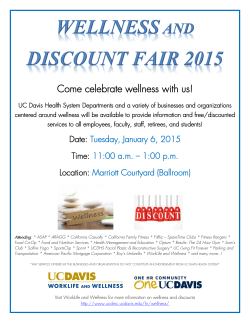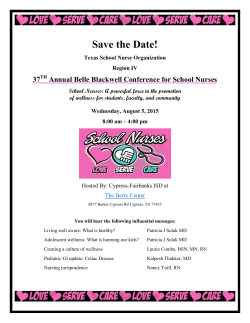
MHFA Newsletter Winter 2014
December, 2014 Volume 1, Issue 2 It’s All About Community! Been helped by ALGEE? Please share your story with us, email: Mhfa_Philly@pmhcc.org C OMMUNITY E MPOWERMENT N UMBERS Philadelphia offers many exciting events to promote mental wellness and community empowerment. From in-person screenings to community forums, these events show that Philadelphia is on the forefront of shattering stigma and building hope. Philadelphia’s Aider community continues to grow. We now have over 7,000 individuals certified, that is over 30% of all Pennsylvania’s Aiders! PA is maintaining second place in the nation and has made huge gains on California, which is in first place. On October 5th, the American Foundation for Suicide Prevention held an “Out of the Darkness Walk” to shed light on the nearly 40,000 people who die annually by suicide. Over 5,000 people turned out and MHFA Philly was there to offer hope, encouragement and RE: ALGEE in Action reassurance. We also encouraged people to register for a MHFA training to learn the warning signs of suicide and other behavioral health challenges. Also in October, DBHIDS and partner agencies spread out across Philadelphia to participate in the nation’s oldest voluntary, (Continued on page 2) MHFA Philly continues to offer trainings FREE of Charge at (Continued on page 2) “Finding the Light Within” collaborative mural for awareness and prevention, Artist James Burns WHAT... C HECK- UP THEN CHECKOUT? On August 5th, the first ever screening kiosk opened outside and inside the Q-Care clinic at the Shoprite of Fox Street. Now customers can not only check their physical health before hitting the checkout line, they can also check their mental wellness. The screening kiosk developed from the Wellness at Your Fingertips Design Challenge. The Challenge was sponsored by the Scattergood Foundation and brought to fruition by two very bright Masters of Public Health candidates from Drexel, Gregory Caplan and Teresa Moore. At the kiosk, customers can take Philly MHFA @PhillyMHFA a screening to see if their responses are consistent with mental health wellness or if further evaluation is needed. They can review information on the signs and symptoms of behavioral health challenges and obtain resources from multiple organizations, including the QCare staff. From August through October, 116 people have utilized the kiosk. The number will grow as requests to replicate this system are pending from other retail clinics. It will only be a matter of time before physical and mental health are viewed as equally important. Read more about the Q-Care Kiosk: CBS Philly Philly.com Community, continued from page 1 community-based screening program, National Depression Screening Day (NDSD). The event, held annually on the first Thursday of the first full week in October, offered prevention and early intervention resources through free in-person screenings. A total of 348 in-person screenings took place providing opportunities to connect individuals to support services. Many more were informed of the Behavioral Health Screening Initiative and went home to get a “check-up from the neck up” on HealthyMindsPhilly.org. communities and highlighting the identified programs trying to break the vicious cycle of these traumas. The day opened with presentations and panel discussions with Dr. Roy Wade (UPENN) and Dr. Jean Wright (DBHIDS) about the impact of trauma and strategies for prevention. Following the panel presentation, we had an amazing dance routine performed by SEEMAC’s Hip-Hop Heritage Dance Group and heard from two intervention programs, Cure Violence and Every Murder Is Real To wrap up this busy month, (EMIR), as they presented on how DBHIDS sponsored the Community their services help communities Resilience: Transforming end the cycle of murder. Communities Symposium. The first, in a series of three, symposia Be on the lookout for the next Community Resilience symposium designed to empower in January. Philadelphians by addressing the impact of trauma on our Numbers, continued from page 1 multiple community hubs. In addition to the hubs, our strategic partnerships have been equally important to Philly MHFA’s success. We are almost to our next benchmark of 10,000 Aiders, but there is still more work to do! Notable Numbers September: - December 2014 School District of Philadelphia: 175 new Youth Aiders and about 30 attended for a refresher Faith Community: 105 new Adult Aiders Juvenile Probation Officers: 129 new Youth Aiders Public Safety: 266 new Adult Aiders DHS: 125 new Adult Aiders Map from Mental Health First Aid, ALGEE-ometer: A State-by-State Count of First Aiders Trained Aider Continuing Education A L G E E Your first step should be your approach. The approach will be different depending on your relationships. If you know the person well you can probably be more direct. If this is a stranger or someone you are not close with, you might want to start with introductions and conversation to make the person comfortable. Always keep the National Suicide Lifeline available, add it to your contacts in your cell phone – 1-800-273-TALK (8255) Listening non-judgmentally takes skill. Remember the conversation is about them, not us. Consider your methods of listening and how you can be there for those in need. http://bit.ly/1w0MLlp Learn more about the use of alcohol and other drugs in adolescence to prepare parents and teens. http:// bit.ly/1FHUZy6 Youth identifying as LGBTQ are at greater risk of bullying and disproportionately make their way into welfare and juvenile justice systems. With a little guidance you can help! http://bit.ly/1nWwwRt Get excited!!! The Network of Care has re-launched allowing people to easily find the appropriate professional help. You can utilize learning resources for health topics and use interactive tools to monitor your wellness. www.networkofcare.org/ College can be a stressful time. Find out how PA and other states are preparing students. http://bit.ly/1zG0XSh Getting a good night sleep is important for our physical and mental wellbeing. Research has shown a link between sleep challenges and risk of mental health disorders. Improving sleep patterns can lower risk of developing a disorder and help reduce the symptoms of a current disorder. http://bit.ly/1csHXZY P HILLY M H F A M EET K EVIN H INES, K EVIN H INES M EET AL GE E ! On October 21st, Philly MHFA travelled to West Chester University (WCU) to meet Kevin Hines. The event was arranged thanks to WCU and the Out of the Darkness campaign to continue their October awareness events. For those of you trained in Youth MHFA you know Kevin’s story, but for others, Kevin’s story is shared in three parts throughout the Youth training. He explains signs and symptoms, the ALGEE action plan, and discusses the day he attempted suicide. Frequently, the last video creates a lengthy discussion. Kevin details the events of September 24, 2000, the day he jumped from the Golden Gate Bridge in San Francisco. Aiders often ask about his physical recovery and debate how Kevin could have been helped. During the event at WCU Kevin detailed more of his life story. He also addressed his continued maintenance of mental wellness and occasional relapse of the more intense symptoms of his bipolar disorder that he manages every day. Kevin continues to support others in recovery as he speaks locally in California and across the country. He trains San Francisco police officers on how to interact with people who are experiencing a mental health disorder or crisis (much like the Public Safety MHFA). Kevin also has a website and wrote a book, Cracked, Not Broken. He is now working on a project that advocates for fences placed along the rails of the Golden Gate Bridge to help remove it as the number one man-made structure used to complete suicide. Find out more about Kevin Hines and his story at: kevinhinesstory.com
© Copyright 2025









